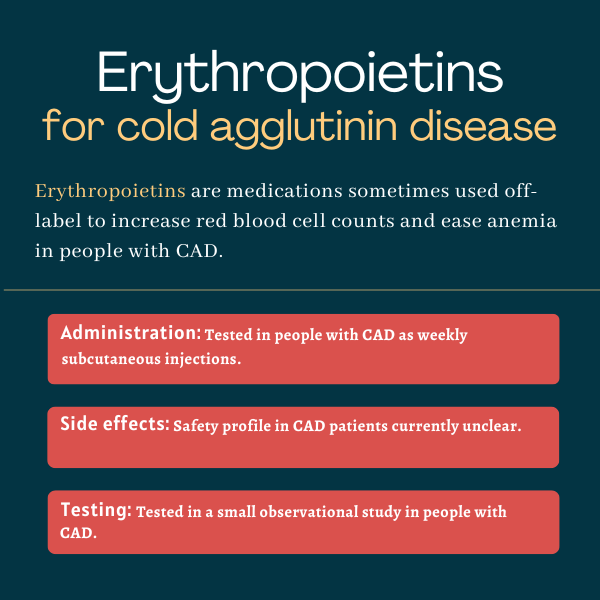Erythropoietins for cold agglutinin disease
Last updated July 16, 2025, by Andrea Lobo, PhD

What are erythropoietins for cold agglutinin disease?
Several forms of lab-made, or recombinant, erythropoietin, a hormone that stimulates red blood cell production in the bone marrow, are approved for treating anemia (low red blood cell counts) due to certain conditions or treatments, and for increasing red blood cell counts in specific situations. While not specifically approved for cold agglutinin disease (CAD), erythropoietin is sometimes used off-label as a CAD-supportive therapy.
CAD is a type of autoimmune hemolytic anemia (AIHA), a group of autoimmune conditions where the body’s immune system mistakenly attacks red blood cells, resulting in their destruction (hemolysis).
In people with CAD, self-reactive antibodies called cold agglutinins target red blood cells at low temperatures. This results in anemia and symptoms like pain and fatigue.
By boosting red blood cell production, erythropoietin medications are believed to help compensate for the loss of red blood cells seen in CAD and to reduce the need for blood transfusions. Also, evidence suggests that erythropoietin may help lower the levels of self-reactive antibodies.
In the U.S., lab-made erythropoietin is sold under the brand names Epogen/Procrit (epoetin alfa), Aranesp (darbepoetin alfa), and Mircera (methoxy polyethylene glycol-epoetin beta), with biosimilars, or highly similar medications, available. These medications may be given via intravenous (into-the-vein) or subcutaneous (under-the-skin) injection.
Therapy snapshot
| Treatment name: | Erythropoietin |
| Administration: | Intravenous or subcutaneous injection |
| Clinical testing: | Evaluated in an observational clinical study in people with CAD |
How are erythropoietins administered in cold agglutinin disease?
In the single observational trial enrolling people with CAD to date, recombinant erythropoietin was administered once weekly by subcutaneous injection, at a dose of 40,000 international units (IU).

Erythropoietins in cold agglutinin disease clinical trials
The safety and efficacy of recombinant erythropoietin, particularly epoetin alfa, in 19 adults with CAD and 28 adults with other AIHA types were investigated in an observational clinical study (NCT05931718).
Participants, enrolled at a single site in Italy, had signs of anemia and hemolysis, as well as insufficient production of immature red blood cells and abnormal levels of erythropoietin. Most had received previous treatment.
Erythropoietin was given by subcutaneous injections, once a week, at a 40,000 IU dose, and some participants received additional standard treatment during the study. Specifically, seven CAD patients were also given rituximab, sold as Rituxan in the U.S. and MabThera in Europe, and commonly used off-label in CAD.
Results showed that 55% of all participants responded to treatment after 15 days and this proportion grew to 91% after one year. For participants to be considered responders, they had to at least achieve a minimum hemoglobin level of 10 g/dL or an increase of at least 2 g/dL without the need for blood transfusions. Hemoglobin is the protein in red blood cells that transports oxygen.
A complete response, reflected by hemoglobin levels of at least 12 g/dL and a normalization of blood levels of hemolysis markers, was achieved by about 70% of participants after one year.
After 15 days of treatment, CAD patients showed a significantly lower response rate (26% vs. 73%) and lower hemoglobin levels (9.7 vs. 11.3 g/dL) relative to the group of 22 patients with warm AIHA, the most common form. While these differences disappeared over time, the results suggest that people with CAD may take longer to respond to erythropoietin.
Erythropoietin-treated patients also showed significantly higher response rates after 15 days, as well as higher hemoglobin levels after 15 days and one year, when compared with an external group of 43 AIHA patients with similar disease features but not treated with erythropoietin during the same period.
A multicenter study in Europe also evaluated erythropoietin in 51 people with AIHA, including 21 with CAD. The majority had received prior treatment, and were given weekly injections of epoetin alfa or darbepoetin alfa, alone or with other therapies.
Similar to the Italian study, 55% of all participants responded to the treatment after 15 days, and again, this rate increased with time, reaching 78% after one year. The rate of complete responses was highest after six months (about 60%), dropping to about 50% at one year.
Erythropoietins side effects in cold agglutinin disease
Due to the observational nature and small sample size of the studies testing erythropoietin in people with CAD, the therapy’s safety profile is yet to be fully established.
The prescribing information of the several forms of recombinant erythropoietin available come with a boxed warning regarding the risk of serious and potentially fatal complications, including:
- cardiovascular and blood-clotting events in people with chronic kidney disease
- tumor progression or recurrence in people with certain cancers.
This treatment can also:
- increase risk of seizures in people with chronic kidney disease
- cause allergic reactions
- cause skin reactions.
Cold Agglutinin Disease News is strictly a news and information website about the disease. It does not provide medical advice, diagnosis, or treatment. This content is not intended to be a substitute for professional medical advice, diagnosis, or treatment. Always seek the advice of your physician or other qualified health provider with any questions you may have regarding a medical condition. Never disregard professional medical advice or delay in seeking it because of something you have read on this website.
Recent Posts
- Long-term Enjaymo use shows favorable outcomes in CAD: Study
- With my health from CAD steadily declining, I call in the cavalry, part 1
- Genetic variations in underlying lymphoma influence AIHA types
- Lessons from ‘Winnie-the-Pooh’ help me navigate life with CAD
- Cost-effective rituximab-based treatment keeps CAD at bay for years
- This year, ongoing CAD symptoms dampened my holiday cheer
- Immunochemotherapy can help control CAD but it carries safety risks
- Oral therapy iptacopan eases anemia in CAD patients: Small trial
- When living with CAD, even a short trip can be a nightmare
- Real-world study confirms long-term safety of Enjaymo for CAD